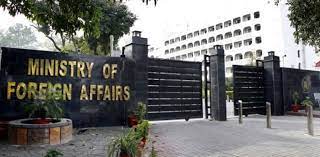UNSC must perform its responsibility of immediate Gaza ceasefire: FO

Celina Ali
Islamabad: Foreign Office on Thursday said that the United Nations Security Council must perform its primary responsibility to impose an immediate and unconditional ceasefire and protect the people of Gaza from an impending genocide.
“We call on Israel’s backers to urge Israel to end its barbaric attacks and inhumane siege against Gaza… We join the (United Nations) Secretary-General in his call to the international community to end the ongoing situation and avert a humanitarian catastrophe,” FO spokesperson Mumtaz Zahra Baloch in her weekly press briefing.

She said Pakistan welcomed the UN Secretary-General’s decision to invoke Article 99 of the UN Charter, to bring to the attention of the UNSC the dire security situation and the humanitarian catastrophe in Gaza. She reiterated Pakistan’s strong and unequivocal condemnation of the continued use of force by Israel and its indiscriminate attacks on civilians and civilian facilities and infrastructure in flagrant violation of international humanitarian law.
She said as the Secretary-General has underscored in his letter to the President of the UN Security Council, “civilians throughout Gaza face grave danger” and “nowhere is safe in Gaza.” “There is a severe risk of collapse of the humanitarian lifeline essential for survival. The situation is fast deteriorating with potentially irreversible implications for Palestine and for peace and security in the region. Such an outcome must be avoided at all costs,” she remarked. Calling for an international conference for long-term peace in Palestine, she said the durable peace in the region would emerge from the internationally agreed two-state solution and from the creation of a secure, viable, contiguous, and sovereign state of Palestine based on the pre-June 1967 borders, with Al-Quds Al-Sharif as its capital. She told the media that a series of visits by senior US officials was taking place this week including Assistant Secretary for Population, Refugees, and Migration, Julieta Valls Noyes; Special Representative on Afghanistan, Tom West; and Principal Deputy Assistant Secretary, Elizabeth Horst.
“Conversations in the first two visits like those of Special Representative Tom West will focus on Afghanistan and Afghanistan-related issues. With the Deputy Assistant Secretary of State of course our agenda would be broader… These visits are part of ongoing dialogue with the US on a range of issues including, but not limited to, the situation in Afghanistan,” she remarked. She said the visits would be an opportunity for both sides to exchange views in Afghanistan, to share respective perspectives on developments taking place, including concerning resettlement of Afghan nationals to the United States, as well as the bilateral cooperation. Discussing the situation in the Indian Illegally Occupied Jammu and Kashmir (IIOJK), the spokesperson said the decision by the Indian Parliament to pass legislation about the future of IIOJK was yet another farce to perpetuate India’s occupation and to deny the people of Jammu and Kashmir their right to self-determination. “Jammu and Kashmir is an internationally-recognized disputed territory, whose final disposition is to be made in accordance with the United Nations Security Council resolutions and as per the aspirations of the Kashmiri people.
Any other process cannot serve as a substitute to the right of self-determination of the Kashmiri people,” she commented. She said Pakistan had repeatedly rejected the relevance of the Indian Constitution to this disputed territory and rejected any measures that perpetuated India’s occupation. “Pakistan will continue to extend political, diplomatic and moral support to our Kashmiri brothers and sisters for the just and peaceful settlement of the Jammu and Kashmir dispute in accordance with the UN Security Council Resolutions.” Highlighting the diplomatic engagements during the last week, the spokesperson mentioned the Additional Foreign Secretary (Africa) Ambassador Shehryar Akbar representing Pakistan at the Peacekeeping Ministerial Meeting held in Ghana where he highlighted the challenges confronting UN peacekeeping and underscored the importance of ensuring safety of peacekeepers and the populations they serve.
He also called on the Vice President of Ghana Dr. Mahamudu Bawumia and Foreign Minister of Ghana Shirley Ayorker Botchwey, besides holding bilateral meetings with the Under-Secretary-General for Peace Operations, Jean-Pierre Lacroix; the UK Minister of States for Armed Forces, James Heappey; and the UAE Assistant Minister of Foreign Affairs for Security and Military Affairs, Dr. Rashed Alkaabi. To a question, Spokesperson Mumtaz Zahra told the media that the Torkham border gate was reopened on Wednesday for all kinds of traffic and the issue regarding the signboard was resolved, and as border officials engaged with each other to resolve such issues whenever they arise. Asked to comment about her lawyer’s statement on Dr Aafia being harassed in Guantanamo Bay and later as well, the spokesperson said the prime minister had directed to take up the matter with the US authorities to investigate and address it.
“In the past as well, we have repeatedly requested the US Department of State and the Department of Justice as well as the prison authorities of FMC Carswell that Dr. Aafia Siddiqui should not be subjected to any sort of physical or mental abuse. The well-being of Dr. Aafia Siddiqui remains our utmost priority, and that of our Missions in Washington and Houston,” she commented. About the attack on former SAPM Shahzad Akbar, she said it was a matter of primary concern for Pakistan, though he had not yet sought any help or assistance from the High Commission. She rejected the insinuations of Pakistan’s involvement and that of Pakistani agencies in such a heinous attack.
“It is not our policy to target our own nationals abroad. Many political dissidents have sought political asylum and have been living in the United Kingdom and other countries around the world for several decades and they have indulged in vitriolic and often undue criticism of Pakistani government and institutions. Many of them have had links with terrorist entities inside Pakistan. Pakistan has not engaged in any extra-territorial attacks against such individuals.” Regarding a question about Kashmiri leader Yasin Malik, she said the plea seeking a death penalty for him reflected the Indian authorities desire to physically eliminate a potent voice of the Kashmiri people. “It is very unfortunate that Mr. Yasin Malik and a large number of Kashmiri leaders, activists and human rights defenders have been incarcerated in IIOJK and jails across India. It is urgent that all charges against Mr. Yasin Malik may be dropped, and all political prisoners including Mr. Yasin Malik may be released,” she added.





